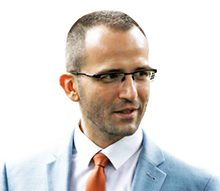By reporting directly to the Defence Secretary, SONAC will be able to speak truth to power on key strategic choices
The Ministry of Defence hit a milestone this week with the establishment of the Secretary of State’s Office of Net Assessment and Challenge (SONAC), a little over three years since Policy Exchange first laid out the full case for it in our report, A Question of Power: Towards Better UK Strategy Through Net Assessment.
Our study carried a Memo to the then-Defence Secretary, Rt Hon Gavin Williamson MP who also endorsed the paper publicly. Soon after, Williamson announced a “permanent Net Assessment Unit” in the MoD’s December 2018 Modernising Defence Programme report. The resulting Strategic Net Assessment (SNA) unit, nestled in the MoD’s wider Strategy unit, struggled for a period against predictable scepticism and funding difficulties.
In December 2020, to his great credit, the current Defence Secretary, Rt Hon Ben Wallace MP, announced the creation of SONAC to “look across all areas of defence, especially doctrine and the equipment choices we are making”. Wallace enlisted one of the country’s most brilliant military minds, Air Marshal Ed Stringer, then Director-General of the Defence Academy and Joint Force Development, to aid in setting up the Office. The March 2021 Integrated Review, led by Policy Exchange alumnus Professor John Bew – drawing on analytical points and concepts put forward in our publications – fully embraced net assessment as one of the main tools to support cross-government strategy-making.
The establishment of SONAC is a remarkable achievement at two levels. Firstly, and most strikingly for Whitehall observers, the Office is deliberately set up to short-circuit the rest of the departmental bureaucracy – including the various “strategy” and “policy” structures in Main Building – and report directly to the Defence Secretary.
This creates the best and only available mechanism for insulating strategic thinking from various departmental and indeed Service agendas and interests that are naturally at play in a defence ministry. The new SONAC is made independent by design, with a specific mandate to challenge strategic assumptions and conventional thinking – in other words, speaking truth to power. In fact, SONAC’s Director is explicitly expected to be the MoD’s “Challenge Champion driving braver engagement with external voices and promoting diversity of thought”. This is desperately needed.
Secondly, the embedding of net assessment at the heart of the MoD may well prove transformational to UK strategy-making in conceptual terms. As Policy Exchange’s original 2018 report explained, net assessment is a comprehensive framework for the long-term strategic analysis of (hard) power balances which measures the overall capabilities of nations in relation to each other, rather than each on its own merits.
One distinctive element is that net assessment is as much focused on analysing the strengths and weaknesses of your own side (including allies) as those of the adversary. It is this aspect which often elicits the strongest resistance from bureaucracies, who see their work and programmes placed under independent and objective scrutiny. Another sensitive side to net assessment is the political analysis that goes with it on, for example, such delicate questions as to whether certain allies would really fight if war comes. Apart from the political risks attached to such analyses potentially leaking out, there is the more critical question of whether civil servants have the skills to perform such political assessments with accuracy and lack of bias.
Net assessment supports more effective defence choices in conditions of long-term military-strategic competition. It was pioneered at the Pentagon from the 1970s – in mid Cold War – by Andy W Marshall who founded and led the US ONA (Office of Net Assessment) for decades. Marshall’s work emphasised the competitive approach in net assessment which rests on identifying and exploiting asymmetries – comparative differences – between opposing sides.
The re-emergence of strategic conditions last seen in the Cold War demands a robust response. As former Chief of the Defence Staff General The Lord Richards of Herstmonceux said in connection with Policy Exchange’s original net assessment report, “Britain needs to rediscover the mentality that helped to win the Cold War if we are to deal effectively with emerging threats like Russia and Iran.”
Of course, SONAC is about more than net assessment or SNA. The new 15-strong Office also comprises a Strategic Analysis (and Challenge) unit which includes red teaming. Together, they amount to a powerful new answer to the persistent problem, in UK and allied planning, of mistaken assumptions, under-estimating adversaries and strategic miscalculation.
As with every new good idea, implementation is key. One challenge I identified early on is protecting net assessment from being pressed into “ordinary service” as just another analytical tool among others in support of the departmental priorities of the day. With strong leadership this can be avoided.
Another essential requirement is to appoint a SONAC Director who really does understand what net assessment and these other instruments are for, and who can also think creatively, inter-disciplinarily, and flexibly about the analytical tasks at hand. Most importantly, the inaugural SONAC leader should come from outside the government system altogether: one of the most precious promises of the Office is that it can introduce genuinely new thinking and perspectives and thus help with Defence culture reform. This opportunity must not be squandered.
The launch of SONAC comes at a critical time for international security, with the twin threats from Russia and China at their most acute in years. As Lord Richards noted in the Foreword to our 2018 report, we need to see a “shift” in our “national strategic mindset: a greater focus on the fundamentals and the balance of military power around the world, and on the ‘big picture’ that too often slips from view.” SONAC is now perfectly placed to help lead that change of mindset. We must all hope it succeeds.

